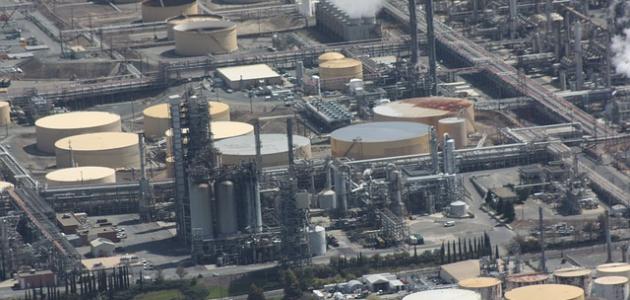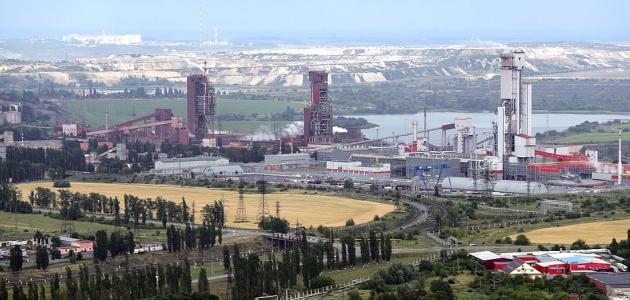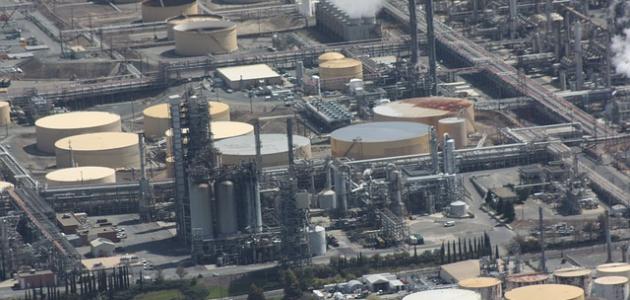petroleum
Petroleum is known as a thick and flammable oily liquid with a yellowish-black color, and it consists of a different variety of hydrocarbons, and it is formed as a result of the decomposition of the remains and fossils of living organisms in the ground under high pressure and temperature, and it is considered one of the non-renewable energy sources ; Because it takes a very long time to form. The word petroleum means oil shale, and it is a Latin word derived from (petra) meaning rock or stone, and (oleum) meaning oil, and it was used for the first time by the German mineralogist Georg Bauer in one of his treatises published in 1556 AD. Oil can be obtained by drilling and prospecting with specific machines and equipment and extracting it from the ground, through companies authorized to carry out this work.
The importance of petroleum
The wars that took place in order to obtain oil are the best evidence of its importance to civilizations. The demand for oil has increased since World War II, and with the establishment of the industrial revolution in 1900 AD, the demand for oil has increased more with regard to internal combustion engines that were used in the field of transportation, in addition to being used in industrial machinery. Petroleum is also used in the manufacture of [[How to manufacture a natural insecticide | Insecticides]] that increase the efficiency of agricultural production. It is also used in the manufacture of plastic equipment and wheel tires that were made of natural rubber. Because the need for synthetic rubber was relatively few until World War II, when the use of natural rubber was banned, and the need to use synthetic rubber appeared more widely, and petroleum is also used in the manufacture of medicines and pharmaceuticals, and its derivatives such as benzene, toluene, and xylene provide raw materials for the manufacture of products that It contributes to the manufacture of dyes, detergents, and fabrics. The importance of oil does not end there, but extends to include:
Read also:What are the benefits of oil in my daily life- Ink industry.
- Upholstery industry.
- CD industry.
- Manufacture of vitamin capsules.
- Dental adhesive industry.
- Manufacture of artificial heart valves.
- Manufacture of some materials used in the anesthesia process.
- cortisone industry.
- Making colored pencils.
- Making some types of pillows.
- artificial grass industry.
- deodorant industry.
- lipstick industry.
- Hair dye industry.
- Aspirin industry.
Petroleum items
Fossil fuels (petroleum) are classified into several categories after they are extracted from the ground through the filtration process, which takes place in several stages and at different temperatures. These items are divided according to the temperature into several products, which are later used in the manufacture of different materials. , Which:
- Gasoline, which is widely used in internal combustion engines.
- Natural gas, which consists mainly of methane.
- Naphtha, which is a highly flammable liquid, is one of the most volatile types of oil.
- Kerosene, also known as paraffin oil.
- Lubricating oil, which is known as the sediment of the petroleum refining process.
- Asphalt, which is defined as a substance that ranges from being a viscous liquid to a solid, and it has a high density, and it tends to be brown or black in color, and it results from the petroleum refining process, or from natural sediments.
Reducing the damages of using petroleum
It is known that petroleum is used as a main energy source more than other available energy sources, and the materials that are produced or made from it are of high demand by consumers, and most of them cannot be dispensed with, such as medicine or agricultural materials. Regardless of the great importance of oil in our lives, it is considered an essential source of air and water pollution, and for this it is necessary to find a way to mitigate its great harm. Therefore, in the 1970s, many oil companies developed mechanisms for filtering and purifying oil and organizing transportation, distribution and consumption. To become less harmful to the environment, gasoline has been developed to burn cleanly without the release of gases, smoke and fumes by reducing the amounts of nitrogen oxides, lead, carbon monoxide and hydrocarbons that are released into the air.
Read also:How are petroleum products separated?Governments are responsible for minimizing the damages resulting from the use of oil. For example, the state and federal government in America control the oil exploration process. To protect the environment and avoid unjust exploration for it, as some areas that contain oil wells are protected areas by the federal government and should not be explored without its permission.
The decline in the importance and use of oil
The greater the demand for oil, the faster it will run out, and thus its price will increase. That is why researchers and people in general are looking for other sources of energy other than oil, so that these sources are not exhaustible. This is after many oil wells were closed and some geologists and researchers lost hope of finding new wells. The task of finding oil wells became a somewhat difficult task, as people in recent years have resorted to renewable energy sources. In order to avoid dependence on oil, which has a high price, which in addition to its high price causes great harm to the environment, and therefore we can say that the importance of oil has decreased to some extent with the advent of renewable energy sources with low cost and little harm to the environment. It is worth noting that some developed countries such as Sweden, Germany and Denmark are moving towards the use of renewable energy sources. Such as solar energy, biofuels, wind and water energy.
Read also:How to extract oil








